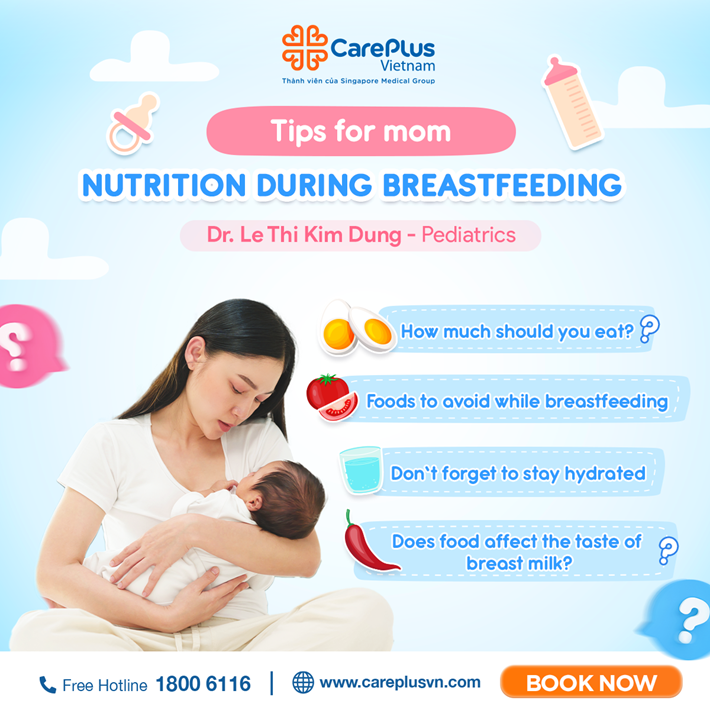Tips for moms: Nutritions During Breastfeeding
Breast milk is the best source of nutrition for infants, especially during the first six months. A mother's diet plays a crucial role in the quality and quantity of breast milk, ensuring the baby grows healthily. Below are some essential nutrition tips for breastfeeding mothers to keep both themselves and their babies healthy.

10/15/2024 2:49:03 PM
1. How much should you eat?
When breastfeeding, a mother needs to consume an additional 400-500 calories per day. However, there’s no need to worry about counting calories; simply eat when you're hungry and stop when you're full. The key is to maintain a healthy, balanced diet, including fruits, vegetables, proteins, and grains, while limiting unhealthy fats.
Be sure to include 2-3 servings of fish per week to get enough omega-3 fatty acids, which help with the baby’s brain and vision development. Choose fish low in mercury, such as salmon or herring.
2. Don’t forget to stay hydrated
Your body needs more water to produce milk. Drink enough water to avoid feeling thirsty and ensure there are no signs of dehydration, such as dry lips or dark urine. It’s a good idea to keep a water bottle nearby to remind yourself to drink regularly.
Try to limit sugary drinks and caffeine, as they may affect your baby’s sleep
3. Essential vitamins and minerals
If your diet is balanced and varied, there’s no need to take additional vitamins or minerals. However, mothers should pay special attention to calcium and vitamin D intake:
- Calcium: During pregnancy and breastfeeding, calcium levels in the body may decrease. Mothers need around 1,000 mg of calcium daily from sources like milk, dairy products, or leafy greens. If dietary intake is insufficient, consider taking calcium supplements as directed by your doctor.
- Vitamin D: Mothers need 600 IU of vitamin D per day to maintain bone health. This can be obtained from milk or supplements.
4. Be cautious when taking medications
If you need to take any medications while breastfeeding, consult your doctor first. Some medications can pass into breast milk and affect your baby.
5. Foods to avoid while breastfeeding
Some foods and beverages should be consumed with caution:
- Alcohol: A small amount of alcohol can pass into breast milk. If you happen to drink, wait at least two hours before breastfeeding.
- Caffeine: It’s best to limit coffee intake. If your baby shows signs of irritability or difficulty sleeping after you’ve had coffee, consider cutting back.
- Fish with high mercury content: Avoid fish like swordfish or mackerel, which are high in mercury, as it can harm your baby’s developing nervous system.
6. Does food affect the taste of breast milk?
Interestingly, babies can "taste" the flavors in your diet. If your baby seems fussy or gassy after you eat certain foods, try eliminating those items and observe if there’s an improvement.
7. Should you diet while breastfeeding?
After giving birth, most mothers gradually return to their pre-pregnancy weight naturally. Breastfeeding is one of the best ways to lose weight, as the body burns about 170 calories per day to produce breast milk.
That said, even when trying to lose weight, it’s essential to maintain a balanced diet to ensure you’re still providing enough nutrients for your baby.
Caring for your baby is a journey filled with love, but it’s also an opportunity for mothers to care for themselves. Hopefully, these nutrition tips will help you feel more confident in nourishing both yourself and your baby. Wishing you health and vitality on this beautiful journey of motherhood!